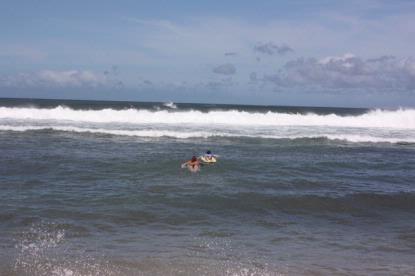 The North Shore. Endless Summer. Sunshine, sandy shores, and sultry surf breaks.
The North Shore. Endless Summer. Sunshine, sandy shores, and sultry surf breaks.
The often-stuffy study of economics is just about the last thing most of us think about when considering the activity, the sport, the lifestyle of surfing. Yet a new type of economics, called Surfonomics, is being used by a new wave (no pun intended) of surfers who are arguing that the best way to save surf breaks is with straight up dollars and sense.
“Surfonomics,” Gregory Thomas writes for The Washington Post, “is an offshoot of natural resource economics that seeks to quantify the worth of waves, both in terms of their value to surfers and businesses and their non-market value — or how much people would be willing to pay not to lose them.”
The article describes the usual pattern of discovery, development, and abandonment “that’s as regular as the tides,” and has occurred over and over in celebrated surf spots around the world over the past several decades. “Surfers trek to remote reaches of the globe in search of the perfect wave. They discover prized beaches. Word gets out. Tourists pile in. Developers seize land and opportunity. Construction alters the wave break. The surf loses its edge.”
But more has been lost than the surf break, argues Chad Nelson, environmental director of the Surfrider Foundation. “The assumption is often that surfing is worth zero dollars,” notes Nelsen. “It’s taken for granted. It’s not perceived as being a viable and important source of economics.”
Surfonomics aims to change that.
“Surf advocates have long argued that Mother Nature is priceless,” continues Thomas, “invoking geological and hydrological mechanics that distinguish the character and appeal of the waves. In a new strategy, Nelsen and a handful of other surf intellectuals are letting go of lofty environmentalist rhetoric and fighting economics with economics.”
For example, in a recent TEDx Talk, Jason Scorse, author of the book What Environmentalists Need to Know About Economics, suggested that it’s counterproductive “to think that the commodification of nature, putting price tags on everything, is the root cause of nature’s destruction.”
It seems an interesting enough angle. And maybe one that can be more effective than limiting any kind of development in a culture that is so market-based.
But still, I wonder whether or not the intrinsic value of something, like a surf break, or a snow-covered summit, or even an ignored patch of woods, is immediately diminished when we try to determine a specific amount of value for it.


